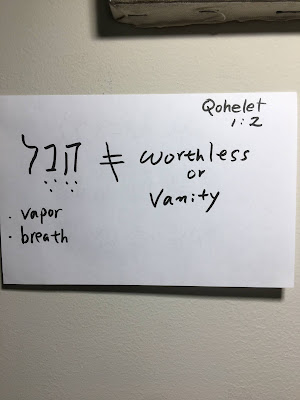Monday, August 16, 2021
Three moments of human experience and transformation
Thursday, August 12, 2021
Liberate the Bible
Strictly speaking, the Bible does not talk to us. The Bible does not mean, but we (as readers) mean with the text. So we need critical engagement with the text, considering various writings in the Bible seriously, and taking a stand about our interpretation.
Authority is not encoded in the text. It is not knowledge or information. It is the power of God that transforms people and the world. It becomes the catalyst for a new humanity. Through the reader's conscientious engagement, the authority of the scriptures may come alive. That is, through our endless, careful interpretation, the word of God for our time can be unlocked, activated, and communicated to the world.
Tuesday, August 10, 2021
Eccl 3:1-8 and Hebel
For everything there is a season, and a time for every matter under heaven:
2 a time to be born, and a time to die;
a time to plant, and a time to pluck up what is planted;
3 a time to kill, and a time to heal;
a time to break down, and a time to build up;
4 a time to weep, and a time to laugh;
a time to mourn, and a time to dance;
5 a time to throw away stones, and a time to gather stones together;
a time to embrace, and a time to refrain from embracing;
6 a time to seek, and a time to lose;
a time to keep, and a time to throw away;
7 a time to tear, and a time to sew;
a time to keep silence, and a time to speak;
8 a time to love, and a time to hate;
a time for war, and a time for peace.
Eccl 3:1-8 should not be understood as fixing God's individual plan for each person. Qohelet does not talk about determinism, so to speak. Hebel (vapor/breath) presupposes all kinds of uncertainties and possibilities in our lives. That is, anything can happen to anyone anytime, be it good or bad. The life of hebel is reminiscent of the Buddhist teaching of annica, which means everything changes. Likewise, there is another similar teaching of Buddhism, which is dukkha ("all are involved in suffering"). While Buddha focuses on suffering, the sheer reality is we live a life of pain and suffering because we are hebel--which is nothing wrong. We need to accept who we are in light of hebel. Do not bother with many things that are not going well. Rather, focus on yourself from a bigger, godly perspective and live a simple life.
전도서에서 "헤벨"(hebel)의 인생은 결국 불교적으로 표현하면 제행무상(諸行無常)과 일체개고(一切皆苦)와 관련이 있다. 모든 것이 변한다. 만사에 고통이 있다. 전도서에서 만사에 때가 있다는 것이 개별적으로 미리 정해진 운명이 있다는 뜻이 아니라 여러가지 일이 다양하게 일어나며 나의 통제안에 있지 않음을 말한다. 그러니 어떤 개별 사건에 너무 집착말고 크게 보고 나에게 집중하고 소박하게 살라는 것이 전도서의 교훈이 아닐까.hebel is not the same as a worthless or useless thing
The issue is how we understand things that exist and disappear, including humans. Ecclesiastes (Qohelet) talks about this. However, many misunderstand "hebel" in Eccl 1:2 and translate it as vanity. The literal meaning of the word is vapor or breath. Vapor represents something evanescent. But simply because something is short-lived or disappears eventually, that does not mean that something is useless or vanity. What is discussed in Qohelet is the sheer reality of not-permanent-being. The question is then: How should we live with this reality that seems to be vanity?
I posted a piece of writing on my wall to remind me of this lifelong question.
Tuesday, July 27, 2021
Faith and Science
Thursday, July 22, 2021
What do I care about?
Tuesday, July 20, 2021
Friday, July 16, 2021
Tomorrow is an extension of today
Tuesday, July 13, 2021
"Nacham" (Job 42:6) as "to repent" or "to comfort"?
-NRSV: "Therefore I despise myself, and repent in dust and ashes.”
I am reading this interesting article: "Advice to Job from a Buddhist Friend" by Sandra B. Lubarsky. [Shofar: An Interdisciplinary Journal of Jewish Studies, Volume 17, Number 3, Spring 1999, pp. 58-68 (Article) Published by Purdue University Press]
"God comes to Job and Job feels God as personally present, as one who knows and cares for him. It may be that the "answer" to such a fundamental question as suffering finds expression in relational terms because the existential need that arises from suffering is ultimately for relationship and care, not for logic. Perhaps it is the case that though there is much that we do not understand, this much we can understand--that we are connected, each to each, to all of creation and (for Jews) to the Creator and that that connection is permeated with God's presence and care. Here Judaism and Buddhism meet--though the one is theistic and the other not--in the belief that the heart of understanding is relationality."
Sunday, July 11, 2021
Interpreting Job
"God comes to Job and Job feels God as personally present, as one who knows and cares for him. It may be that the "answer" to such a fundamental question as suffering finds expression in relational terms because the existential need that arises from suffering is ultimately for relationship and care, not for logic. Perhaps it is the case that though there is much that we do not understand, this much we can understand--that we are connected, each to each, to all of creation and (for Jews) to the Creator and that that connection is permeated with God's presence and care. Here Judaism and Buddhism meet--though the one is theistic and the other not--in the belief that the heart of understanding is relationality."









